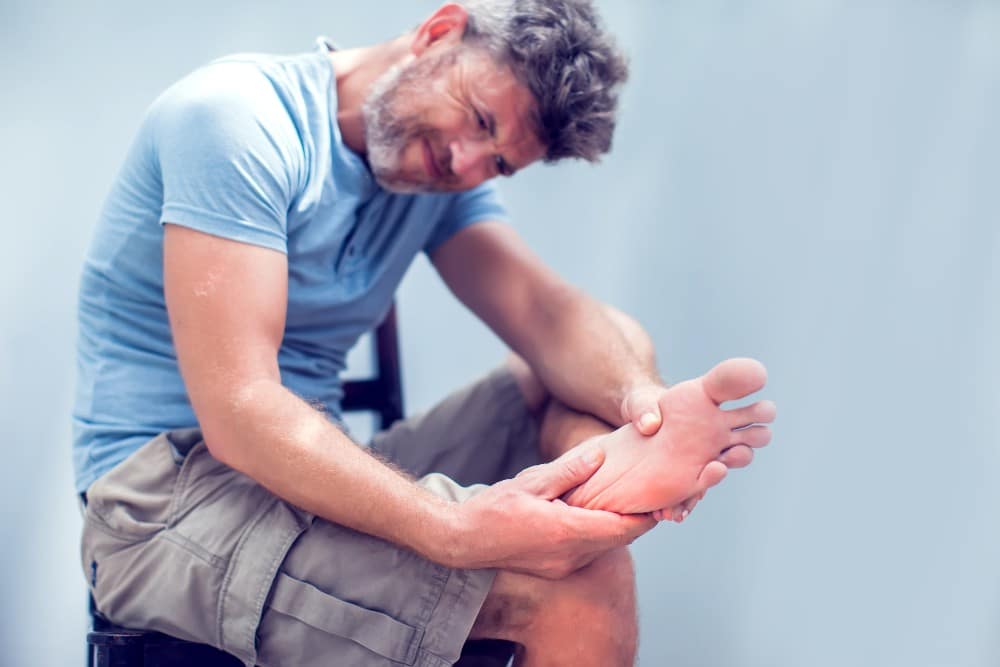Heel Pain While Running? Here’s What You Need to Do!
Ah, the sweet freedom of running – wind in your hair, feet pounding the pavement, and…OUCH! A sudden heel pain crashes the party, throwing a wrench in your stride. It’s as if your heels are shouting, “Hey there, buddy! Can you give us a break?”
Well don’t worry, fellow pavement-pounders; we’ve got your back (or rather, your heels)!
In the high-stakes world of heel pain, we’ll be your trusty sidekicks. Together, we’ll dive into the mysterious realm of achy heels, unmasking those pesky villains that try to bring your running to a halt. We’ll arm you with remedies and strategies to kick heel pain to the curb and reclaim your running rhythm. So, lace up those sneakers and get ready for an action-packed adventure that will have you conquering the pavement once again, pain-free and full of pep!
Why You May Be Suffering From Heel Pain While Running
Heel pain can be caused by a myriad of reasons, but when it comes to running, some culprits are more common than others. Let’s investigate three major suspects lurking in the shadows, causing havoc in your running routine.
Flat Feet
Flat feet, also known as fallen arches or overpronation, can be a primary cause of heel pain. When the arch of your foot collapses, it creates undue stress on your heel, which can lead to discomfort and pain. Running with flat feet can aggravate the issue, causing a misalignment in your stride and forcing your heels to absorb more shock than they’re designed to handle.
Achilles Tendinitis
The Achilles tendon is the thick, sturdy cord that connects your calf muscles to your heel bone. When you overuse or strain this tendon, it can become inflamed, resulting in Achilles tendinitis. Running on uneven surfaces, rapidly increasing your mileage, or wearing unsupportive footwear can all contribute to this condition, making your heels cry out for mercy.
Plantar Fasciitis
Our next perpetrator is the notorious plantar fasciitis – the bane of many runners’ existence. This condition occurs when the plantar fascia, a thick band of tissue connecting your heel to your toes, becomes inflamed. The pain is often most severe in the morning or after periods of inactivity. Factors such as excessive pronation, tight calf muscles, or running on hard surfaces can all contribute to the development of plantar fasciitis.
Stress Fracture
Stress fractures are tiny cracks in the bone due to repetitive force and overuse. While they can happen in various parts of the body, runners often experience stress fractures in their heels. These injuries can be caused by a sudden increase in training intensity, improper footwear, or running on hard surfaces. The pain from stress fractures often starts mild but gradually worsens as you continue to run, making it crucial to address the issue early on.
Nerve Irritation
Nerve irritation, particularly in the heel, can result in a condition called Baxter’s neuritis or tarsal tunnel syndrome. Compression or irritation of the nerves in your feet can cause a burning, tingling, or shooting pain in your heel. Runners with tight shoes, biomechanical imbalances, or a history of foot injuries may be more susceptible to nerve irritation. This undercover troublemaker can wreak havoc on your running routine, so it’s important to identify and address the issue to keep your heels happy and healthy.
How to Treat Heel Pain After Running
When heel pain strikes, don’t let it hold you hostage! By following these trusty treatments, you’ll be on the road to recovery and back to pounding the pavement in no time.
Take breaks: First and foremost, give your heels some well-deserved rest. Taking breaks from running will allow your body to heal and recover. Remember, it’s better to have a few days off now than to be sidelined with pain for weeks or months.
RICE: The RICE method (Rest, Ice, Compression, and Elevation) is your go-to for treating heel pain. Rest your feet, apply ice to the affected area for 15-20 minutes several times a day, use compression to reduce swelling, and elevate your feet to minimize inflammation.
Nonsteroidal anti-inflammatory drugs: Over-the-counter pain relievers like ibuprofen or naproxen can help reduce pain and inflammation. Use them as directed and consult our doctors if your pain persists or worsens.
Change footwear if needed: Your shoes could be adding to or causing your heel pain. Make sure you’re running in shoes that provide proper support and cushioning. If your shoes are worn out or ill-fitting, it’s time to invest in a new pair that’ll keep your feet comfortable and pain-free.
Make sure to warm up before and cool down after runs: Warming up before you run helps prepare your muscles and joints for the workout ahead. Cooling down afterward helps prevent stiffness and promotes recovery. Both are essential for keeping heel pain at bay and ensuring a smooth, enjoyable running experience.
When to Get Professional Treatments
While most heel pain can be managed with at-home remedies, there are instances when seeking professional help is necessary. Don’t ignore your heel pain – it’s better to be safe than sorry!
If you’ve been diligently following the RICE method and taking over-the-counter pain relievers, but your heel pain persists or worsens, it’s time to consult our heel pain experts. They can help diagnose the underlying issue and recommend appropriate treatment options.
Professional Treatments for Heel Pain that Work
When it’s time to call in the big guns, there are a few professional treatments that can help you combat heel pain:
Custom Orthotics
Custom orthotics are specially designed shoe inserts that provide support and cushioning to help alleviate heel pain. Our podiatrists can assess your feet and create custom orthotics tailored to your specific needs.
Laser Therapy
Our laser therapy is a non-invasive treatment option that uses light to stimulate cell regeneration and reduce inflammation. This therapy can help speed up the healing process and reduce pain in various conditions, including heel pain. Contact our office to determine if laser therapy is a suitable option for your situation.
Start Your Journey Toward Heel Pain Relief Today
Whenever you face a challenge like heel pain, it’s crucial to consult with healthcare professionals like Premier Podiatry & Orthopedics. We will provide a comprehensive assessment, including imaging tests if needed, and engage in a thorough discussion about your specific situation before recommending any treatment options. Understanding how your condition impacts your daily life allows our doctors to customize the most effective treatment plan for you.
If you’re experiencing heel pain or any other foot-related issue that requires expert care, don’t hesitate to schedule an appointment. You can easily reach out to us today by filling out an online contact form. Remember, your well-being is our top priority, and we are here to help you get back on your feet – literally!
Looking to schedule an appointment with a physician?
Carmichael Office
6620 Coyle Avenue,
Suite 202
Carmichael, CA 95608
Roseville Office
576 N Sunrise Avenue,
Suite 230
Roseville, CA 95661
Folsom Office
1580 Creekside Drive,
Suite 100 & 110
Folsom, CA 95630
Social
© Premier Podiatry & Orthopedics. All Rights Reserved. | Privacy Policy

